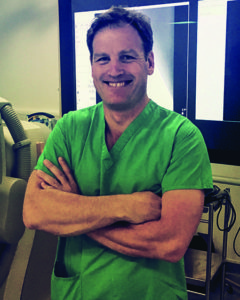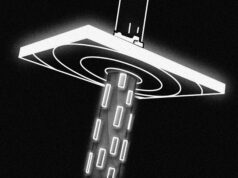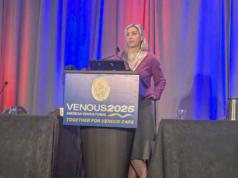 Stephen Black speaks to Venous News about his career to date. Despite having, in his own words, done “terribly” in an interview for a vascular senior house officer role at St Mary’s Hospital in London, England, Black is now consultant vascular surgeon at Guy’s and St Thomas’ NHS Foundation Trust and professor of venous surgery at King’s College London. He is on the cutting edge of venous research and is currently co-principal investigator for multiple clinical trials including ABRE, VIAFORT and DEFIANCE. Alongside discussing his own career, Black also considers the state of the venous field more widely, outlining patient selection and “maintenance of results” as two of the biggest challenges at present. Randomized data in the field are much needed, he says, indicating that ‘big data’ and artificial intelligence (AI) might provide some solutions to the difficulties of conducting such research. Finally, Black outlines his hobbies and interests outside of medicine, highlighting the importance of his family and a love for sport.
Stephen Black speaks to Venous News about his career to date. Despite having, in his own words, done “terribly” in an interview for a vascular senior house officer role at St Mary’s Hospital in London, England, Black is now consultant vascular surgeon at Guy’s and St Thomas’ NHS Foundation Trust and professor of venous surgery at King’s College London. He is on the cutting edge of venous research and is currently co-principal investigator for multiple clinical trials including ABRE, VIAFORT and DEFIANCE. Alongside discussing his own career, Black also considers the state of the venous field more widely, outlining patient selection and “maintenance of results” as two of the biggest challenges at present. Randomized data in the field are much needed, he says, indicating that ‘big data’ and artificial intelligence (AI) might provide some solutions to the difficulties of conducting such research. Finally, Black outlines his hobbies and interests outside of medicine, highlighting the importance of his family and a love for sport.
Why did you decide to pursue a career in medicine and why, in particular, did you choose to specialize in vascular and venous surgery?
I grew up in South Africa and we were given a very clear set of instructions at school. Choose between law, accounting, medicine or engineering. So, I chose medicine. Not particularly romantic but it made the most sense. Nowadays we would have likely had a very different discussion.
Vascular came about really by a series of decisions, none of which were conscious decisions, to choose it. I had wanted to do plastic surgery or orthopedics and having moved from South Africa to the UK, I was working as a locum in Brighton. I was, at the time, living in Parsons Green, London, and the commute became really tricky. I looked in the British Medical Journal careers section and saw a senior house officer job in vascular advertised at St Mary’s Hospital. The commute to Mary’s was much easier so I applied for it. I was interviewed by Mike Jenkins and Nick Cheshire and did terribly. Ultimately, however, I got the job (after a few others dropped out!) and so began my journey in vascular. I ended up doing my research at Mary’s with John Wolfe and never looked back. Sometimes you have to go where the current takes you.
Who have been your career mentors and what is the best advice they have given?
I have been fortunate to have had many great mentors over the years. Bernie Little was a general surgeon and Head of Department at Edendale Hospital in Pietermaritzburg, South Africa. He was fantastic in setting me up for a career in surgery. After that I benefited a lot from support from Richard Corbett, a vascular surgeon in Haywards Heath, England, where I was a locum, who got me onto my first projects and was very supportive.
From the time of getting to Mary’s, John Wolfe, Mike Jenkins and Rick Gibbs were amazing and helped me navigate the politics of research. I have not always been very good at that! My subsequent training really benefited from support from all the people I trained with. Neil Browning, Martin Thomas, Kieren Dawson at Ashford and St Peters Hospital (Chertsey, England), Peter Leopold and David Gerrard at Frimley Hospital (Frimley, England), and then Kevin Burnand, Peter Taylor and Rachel Bell at St Thomas’ Hospital and Ian Loftus, Matt Thompson and Tom Loosemore at St George’s Hospital (London, England). I think all contributed hugely to shaping the way I think and act as a surgeon and gave me the confidence to develop and grow. Rachel in particular was instrumental in helping me get to St Thomas’ and I will always be grateful for that.
The main advice that was consistent from all of them was that a simple plan is a good plan. I have always taken that to heart. It is very easy to try and over complicate surgery, particularly in the endovascular era.
Outside of my training I have been grateful to meet and learn from amazing people in the venous space—Peter Neglen and Bo Eklof were amazing in setting me up for success and I have really learned a lot from Gerry O’Sullivan, Rick De Graaf, Nils Kucher, Neils Baekgaard, Erin Murphy, Marianne De Maeseneer, Kush Desai, Nicos Labropoulus, Tony Gasparis and Steve Elias. I genuinely would not be where I am without them. The venous world has a phenomenal group of enthusiastic physicians and there are a number of others that I could include in this list.
It is not, however, just about mentors. I have been very lucky to have a great team at St Thomas’ without whom I would be a failure. Karen Breen, Beverley Hunt, Ander Cohen (thrombosis experts), Narayan Karunanithy, Narayanan Thulasidasan, Athanasios Diamantopolous, Tarun Saburwhal, Irfan Ahmed (interventional radiology), Lily Benton, Diana Roque, Eleanor Davies, Belen Quintana, Azeb Mengtsu, Vanessa Livingstone (research team and clinical nurse specialists), Chung Lim, Emma Wilton, Leslie Fiengo, Taha Khan, Mohamed Sayed, Mohamad Taha (great fellows), Adam Gwozdz, Rachael Morris, Anna Pouncey and Ehsanhul Choudhery (research fellows) have all made work fun and special. Now, my consultant colleagues in venous—Soundrie Padayachee (duplex), Taha Khan, Prakash Saha and Bhavesh Natha—have added tremendous value. There are of course multiple other team members and I am grateful to them all. Success is never a solo pursuit.
What has been the most important development in the venous space during your career so far?
I think the introduction of dedicated venous stents really changed things. At that time they were introduced, treating venous patients was still a swear word in many respects, but that view has changed dramatically in the last few years. This brought growth and ultimately led to all the large medical technology companies really committing to the venous space. Allied with growth in thrombectomy devices there is really now a tangible change in the attitude to venous.

What are the biggest challenges currently facing the venous world?
I think the biggest challenge is patient selection and what I would call maintenance of results. Unlike peripheral arterial disease (PAD) and aortic patients, venous patients need the procedure to last for 40–50 years, and we need to make sure we can do that. We have already seen from the investigational device exemption (IDE) studies that there is a patency drop off at three years and this needs to be better. We need to move from a focus on the stent to how we can improve the long-term outcomes.
You are the global and UK principal investigator for a number of ongoing trials. Could you outline some of the research you are currently involved in? Is there a trial you are particularly excited to see the results for?
I am particularly excited by three new studies. The Gore VIAFORT study, which I am doing with Kush Desai, is introducing the first dedicated inferior vena cava (IVC) stent, which will give us something different for these patients and hopefully improve the outcomes in this difficult group.
DEFIANCE, funded by Inari Medical, is a randomized controlled trial (RCT) for mechanical thrombectomy. We absolutely need more data in this space and it’s great that Inari have committed to this. We are using the same core lab and training as ATTRACT so I hope this will give us a positive study—or at least show if we are on totally the wrong track.
The final study is DEXTERITY from Mercator MedSystems. This is particularly interesting, and I hope paves the way for broadening treatments to the femoropopliteal segment. This is a very neglected part of venous and the patients struggle. I think the potential of drug therapy delivered directly to the vessel wall is really exciting.
What do you think are some of the major trials needed in the venous space?
We absolutely need more RCTs in all areas but these have proved hard to deliver. I think this is due to equipoise problems for both patients and doctors.
There are some novel trial designs and I hope these will change the nature of how we do studies in the future. We need data for acute and chronic treatment plus ulcer care. In the latter, we especially need data on the role of the deep system in ulcer recurrence and failure to heal.
What do you think research might look like in the future? Are there alternatives to the ‘gold standard’ of the randomized controlled trial?
As above I think the potential lies in so-called ‘big data’. There are opportunities to utilize this and AI-driven analysis that allow us to derive answers using the concept of causal inference for example. This may help address recruitment problems and cost.
There is little point in an RCT that takes ten years to finish recruitment as by that time the goal posts have always moved.
Could you outline one of your most memorable cases?
I still remember the first-in-human VICI case that I performed in 2014. She was a young Spanish lady with very significant venous claudication and we got a really good result. This was pivotal for me as I was fortunate to be able to do the case and was joined by Peter Neglen. It was really special to operate with him. She has now been fine for nine years and has gone on to have children and been symptom free. It opened my eyes to the potential in treating venous outflow obstruction.
What advice would you give to someone looking to start a career in medicine and/or looking to specialize in venous surgery?
Medicine is an exciting and diverse career. If making money is the sole objective it’s not the career to choose, but if you want to transform lives and influence the world in a small way then it is a great career. Venous is an open field with enormous opportunity to shape the future for young surgeons, radiologists or other specialists who treat this disease. We have a lot to learn and there are so many patients who still need solutions. There is no better opportunity to make a mark than venous right now in vascular surgery.
What are your hobbies and interests outside of medicine?
My main focus outside medicine is my family. I am married to a long-suffering wife, Quita, who has had to put up with me and done an amazing job at that. I have two great kids, Amber-Jade and James, and I really enjoy spending time with them and supporting their sport and journey through life. I would be lost without them.
Apart from that my main interest is rugby. I am a die-hard Springbok fan and match days are a perpetual cauldron of emotion. I will pretty much watch any sport and enjoy trying to play (badly) where I can. My kids have recently convinced me to take up hockey!











